Collateral ligament (CL) injury - aftercare
Medial collateral ligament injury - aftercare; MCL injury - aftercare; Lateral collateral ligament injury - aftercare; LCL injury - aftercare; Knee injury - collateral ligament
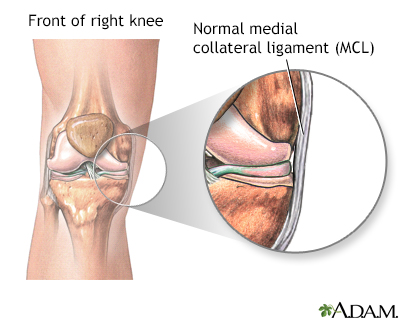
The medial collateral ligament connects the end of the femur (thigh) to the top of the tibia (shin bone). The medial collateral ligament provides stability against valgus stress. A valgus stress is described as a pressure applied to the leg that tries to bend the lower leg sideways at the knee, away from the other leg. Tackling in football or soccer are two common causes of this injury.

The location of knee pain can help identify the problem. Pain on the front of the knee can be due to bursitis, arthritis, or softening of the patella cartilage as in chondromalacia patella. Pain on the sides of the knee is commonly related to injuries to the collateral ligaments, arthritis, or tears to the meniscuses. Pain in the back of the knee can be caused by arthritis or cysts, known as Baker's cysts. Baker's cysts are an accumulation of joint fluid (synovial fluid) that forms behind the knee. Overall knee pain can be due to bursitis, arthritis, tears in the ligaments, osteoarthritis of the joint, or infection. Instability, or giving way, is also another common knee problem. Instability is usually associated with damage or problems with the meniscuses, collateral ligaments, or patella tracking.
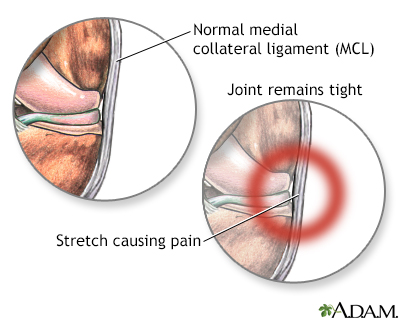
Initial treatment of an MCL injury includes ice to the area, elevation of the joint above the level of the heart, non-steroidal anti-inflammatory drugs (NSAIDs), and limited physical activity until the pain and swelling subside. A hinged knee immobilizer should be used to protect the ligament as it heals. The extent of this type of injury is usually excessive stretching of the ligament causing the pain and tenderness.
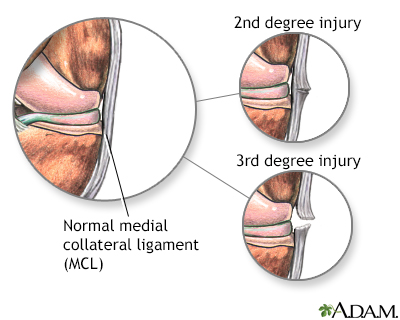
A second degree injury is a partial tear with no firm endpoint when the joint is stressed, and a third degree is a complete tear of the ligament. A physical examination will be done to test the extent of damage. Some other tests may include an MRI or joint X-ray.
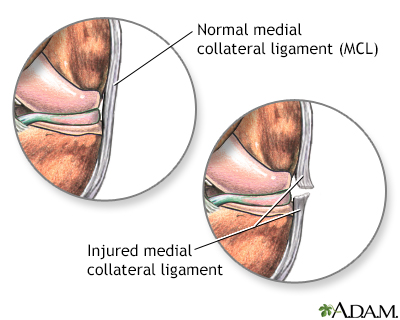
A torn (MCL), is an injury to the medial collateral ligament. This ligament extends from the upper-inside surface of the tibia to the bottom-inside surface of the femur. The ligament prevents the knee joint from medial instability, that is, instability in the inside of the joint.
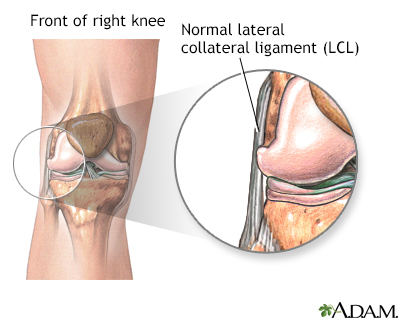
The lateral collateral ligament connects the end of the femur (thigh) to the top of the fibula (the thin bone that runs next to the shin bone). The lateral collateral ligament provides stability against varus stress. Varus stress is described as a pressure applied to the leg that tries to bend the lower leg sideways at the knee, toward the other leg. Activities such as skiing, football and soccer can all lead to this injury.
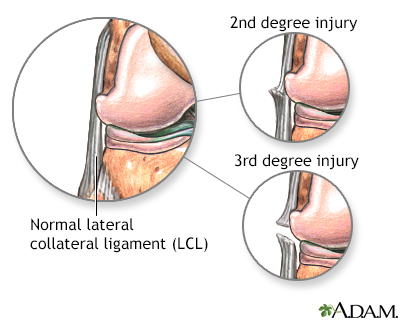
A second degree injury is a partial tear with no firm endpoint when the joint is stressed, and a third degree is a complete tear of the ligament. A physical examination will be done to test the extent of damage. Some other tests may include an MRI or joint X-ray.
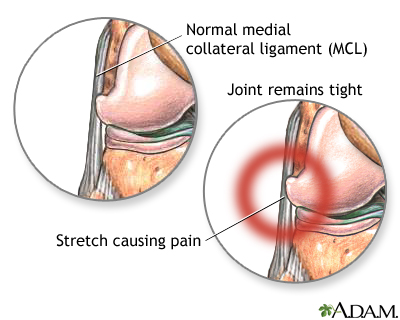
Initial treatment of an LCL injury includes ice to the area, elevation of the joint above the level of the heart, non-steroidal anti-inflammatory drugs (NSAIDs), and limited physical activity until the pain and swelling subside. A hinged knee immobilizer should be used to protect the ligament as it heals. The extent of this type of injury is usually excessive stretching of the ligament causing the pain and tenderness.
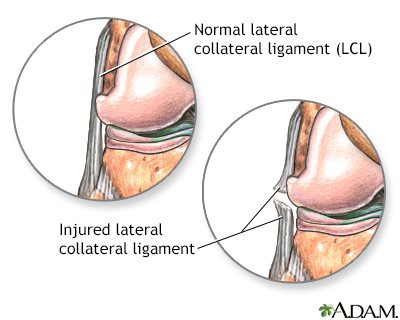
A torn (LCL), is an injury to the lateral collateral ligament, a ligament extending from the top-outside surface of the fibula to the bottom-outside surface of the femur. The ligament prevents the knee joint from side-to-side (lateral) instability.
More About Your Injury
The collateral ligaments help keep your knee stable. They help keep your leg bones in place and keep your knee from moving too far sideways.
A collateral ligament injury can occur if you get hit very hard on the inside or outside of your knee, or when you have a twisting injury.
Skiers and people who play basketball, football, or soccer are more likely to have this type of injury.
What to Expect
With a collateral ligament injury, you may notice:
- A loud pop when the injury occurs
- Your knee is unstable and can shift side to side as if it "gives way"
- Locking or catching of the knee with movement
- Knee swelling
- Knee pain along the inside or outside of your knee
After examining your knee, the your health care provider may order these imaging tests:
- X-rays to check for damage to the bones in your knee.
- An MRI of the knee. An MRI machine takes special pictures of the tissues inside your knee. The pictures will show whether these tissues have been stretched or torn.
If you have a collateral ligament injury, you may need:
- Crutches to walk until the swelling and pain get better
- A brace to support and stabilize your knee
- Physical therapy to help improve joint motion and leg strength
- Surgery to repair the collateral ligament or other associated injuries
Most people do not need surgery for an MCL injury. However, you may need surgery if your LCL is injured or if your injuries are severe and involve other ligaments in your knee.
Self-care at Home
Follow R.I.C.E. to help reduce pain and swelling:
- Rest your leg. Avoid putting weight on it.
- Ice your knee for 20 minutes at a time, 3 to 4 times a day. Do not apply ice directly to your skin. Wrap the ice in a clean cloth first.
- Compress the area by wrapping it with an elastic bandage or compression wrap.
- Elevate your leg by raising it above the level of your heart.
You can use ibuprofen (Advil, Motrin), or naproxen (Aleve, Naprosyn) to reduce pain and swelling. Acetaminophen (Tylenol) helps with pain, but not swelling. You can buy these pain medicines at the store.
- Talk with your provider before using these medicines if you have heart disease, high blood pressure, kidney disease, or have had stomach ulcers or internal bleeding in the past.
- Do not take more than the amount recommended on the bottle or by your provider.
Activity
You should not put all of your weight on your leg if it hurts. You should check with your provider about how much weight you may put on your leg. Rest and self-care may be enough to allow the tear to heal. You should use crutches to protect the injured ligament.
You may need to work with a physical therapist (PT) to regain knee and leg strength. The PT will teach you exercises to strengthen the muscles, ligaments, and tendons around your knee.
As your knee heals, you can return to normal activities and, for most people, eventually play sports again.
When to Call the Doctor
Contact your provider if:
- You have increased swelling or pain
- Self-care does not seem to help
- You lose feeling in your foot
- Your foot or leg feels cold or changes color
If you have surgery, contact your surgeon if you have:
- A fever of 100°F (38°C) or higher
- Drainage from the incisions
- Bleeding that won't stop
References
Lamplot JD, Bogunovic L, Wright RW. Revision anterior cruciate ligament injuries. In: Miller MD, Thompson SR, eds. DeLee, Drez, & Miller's Orthopaedic Sports Medicine. 5th ed. Philadelphia, PA: Elsevier; 2020:chap 99.
Lento P, Marshall B, Akuthota V. Collateral ligament sprain. In: Frontera WR, Silver JK, Rizzo TD Jr, eds. Essentials of Physical Medicine and Rehabilitation. 4th ed. Philadelphia, PA: Elsevier; 2019:chap 66.
Miller RH, Azar FM. Knee injuries. In: Azar FM, Beaty JH eds. Campbell's Operative Orthopaedics. 14th ed. Philadelphia, PA: Elsevier; 2021:chap 45.
Yonz MC, Wilson BF, Blake MH, Johnson DL. Medial collateral ligament and posterior medial corner injuries. In: Miller MD, Thompson SR, eds. DeLee, Drez, & Miller's Orthopaedic Sports Medicine. 5th ed. Philadelphia, PA: Elsevier; 2020:chap 101.
Version Info
Last reviewed on: 4/24/2023
Reviewed by: C. Benjamin Ma, MD, Professor, Chief, Sports Medicine and Shoulder Service, UCSF Department of Orthopaedic Surgery, San Francisco, CA. Also reviewed by David C. Dugdale, MD, Medical Director, Brenda Conaway, Editorial Director, and the A.D.A.M. Editorial team.
